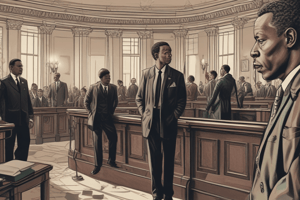Podcast
Questions and Answers
What are the two primary methods of enforcing racial separation in public areas?
What are the two primary methods of enforcing racial separation in public areas?
- Court orders and police brutality
- Public opinion and community pressure
- Social change and the status quo
- Segregation laws and Assimilation (correct)
The Brown vs. Board of Education case effectively reversed the "separate but equal" doctrine from Plessy vs. Ferguson.
The Brown vs. Board of Education case effectively reversed the "separate but equal" doctrine from Plessy vs. Ferguson.
True (A)
Which of the following is NOT a protected characteristic under the Civil Rights Act of 1964?
Which of the following is NOT a protected characteristic under the Civil Rights Act of 1964?
- Sexual orientation (correct)
- Gender
- Race
- National origin
What is the definition of common law?
What is the definition of common law?
Which of these nations is NOT considered a common law nation?
Which of these nations is NOT considered a common law nation?
What is the primary characteristic of civil law tradition?
What is the primary characteristic of civil law tradition?
What are the two types of crimes categorized by their inherent nature?
What are the two types of crimes categorized by their inherent nature?
What is the name given to the legal principle that requires evidence obtained illegally to be excluded from a trial?
What is the name given to the legal principle that requires evidence obtained illegally to be excluded from a trial?
Which of the following is NOT a recognized philosophy of punishment?
Which of the following is NOT a recognized philosophy of punishment?
The 19th Amendment, which was ratified in 1920, granted women the right to vote in the United States.
The 19th Amendment, which was ratified in 1920, granted women the right to vote in the United States.
What is the main goal of restorative justice?
What is the main goal of restorative justice?
The ______ is a process that shapes our values and norms, often beginning within our families.
The ______ is a process that shapes our values and norms, often beginning within our families.
Flashcards
Segregation Laws
Segregation Laws
Laws that enforced racial separation in public spaces, such as schools and restaurants.
Assimilation
Assimilation
The process of integrating minority groups into the dominant culture, often through legal and societal pressures.
Brown v. Board of Education
Brown v. Board of Education
A landmark Supreme Court case that desegregated public schools in 1954.
Civil Rights Act of 1964
Civil Rights Act of 1964
Signup and view all the flashcards
Common Law
Common Law
Signup and view all the flashcards
Civil Law Tradition
Civil Law Tradition
Signup and view all the flashcards
Chinese Socialist Law
Chinese Socialist Law
Signup and view all the flashcards
Mala in se
Mala in se
Signup and view all the flashcards
Mala Prohibita
Mala Prohibita
Signup and view all the flashcards
Elements of Criminal Liability
Elements of Criminal Liability
Signup and view all the flashcards
Crime Control Model
Crime Control Model
Signup and view all the flashcards
Due Process Model
Due Process Model
Signup and view all the flashcards
Exigent Circumstance
Exigent Circumstance
Signup and view all the flashcards
Mapp v. Ohio
Mapp v. Ohio
Signup and view all the flashcards
Criminal Procedure
Criminal Procedure
Signup and view all the flashcards
Standard of Proof
Standard of Proof
Signup and view all the flashcards
Tort Reform
Tort Reform
Signup and view all the flashcards
Tort Law
Tort Law
Signup and view all the flashcards
Contract Law
Contract Law
Signup and view all the flashcards
19th Amendment
19th Amendment
Signup and view all the flashcards
Patriarchy
Patriarchy
Signup and view all the flashcards
Distributive Justice
Distributive Justice
Signup and view all the flashcards
Retributive Justice
Retributive Justice
Signup and view all the flashcards
Restorative Justice
Restorative Justice
Signup and view all the flashcards
Social Change
Social Change
Signup and view all the flashcards
Administrative Law
Administrative Law
Signup and view all the flashcards
Juvenile Courts
Juvenile Courts
Signup and view all the flashcards
Philosophies of Punishment
Philosophies of Punishment
Signup and view all the flashcards
Plea Bargaining
Plea Bargaining
Signup and view all the flashcards
Vice Crimes
Vice Crimes
Signup and view all the flashcards
Prohibition Era
Prohibition Era
Signup and view all the flashcards
Age of Consent
Age of Consent
Signup and view all the flashcards
2nd Amendment
2nd Amendment
Signup and view all the flashcards
Feminist Jurisprudence
Feminist Jurisprudence
Signup and view all the flashcards
Juvenile Delinquency Treatment
Juvenile Delinquency Treatment
Signup and view all the flashcards
Socialization Process
Socialization Process
Signup and view all the flashcards
Study Notes
Oppression of Minority Groups through Legislation
- Segregation laws enforced racial separation in public spaces
- Assimilation of minority groups involved integrating them into the dominant culture through legal and societal pressure
Brown v. Board of Education (1954)
- Landmark case desegrating public schools
- Overturned the "separate but equal" doctrine from Plessy v. Ferguson
Civil Rights Act (1964)
- Prohibited discrimination based on race, color, religion, sex, or national origin
Common Law
- Definition: Judge-made laws based on precedent
- Origin: Britain
- Common Law Nations: Canada, New Zealand
Civil Law Tradition
- Definition: A coded type of legal system
- Example: Code of Hammurabi
- Civil Law Nations: France, Germany
Chinese Socialist Law
- Characteristics: Inquisitorial legal system, adversarial elements
Meaning of Crime
- Mala in se: Crimes inherently evil (e.g., murder)
- Mala prohibita: Crimes prohibited by law
Limitations on Criminal Law
- 5 Elements of Criminal Liability: Harm, Concurrence, Actus reus (criminal act), Mens rea (criminal intent), Causation
Crime Control vs. Due Process Models
- Crime Control: Focus on justice for society
- Due Process: Focus on justice for the offender
Exigent Circumstances
- Exception to the warrant requirement when immediate action is necessary
Mapp v. Ohio
- Supreme Court case that applied the exclusionary rule to states
Criminal Procedure
- Rules on government operations during arrests and investigations
Standard of Proof
- Civil Case: Preponderance of evidence
- Criminal Case: Beyond a reasonable doubt
Tort Reform
- Changes to reduce litigation or damages in civil lawsuits
Tort Law
- Deals with civil wrongs (e.g., negligence)
Contract Law
- Requires an agreement between two parties
19th Amendment (1920)
- Granted women the right to vote
Patriarchy
- System where men hold power over women
Types of Justice
- Distributive Justice: Fair allocation of resources
- Retributive Justice: Focus on punishment
- Restorative Justice: Victim-centered, aims to repair harm
Social Change
- Inevitability of societal evolution
- Resistance to change: Profit, comfort, fear of discomfort
Administrative Law
- Part of civil law, governs regulatory agencies
Juvenile Courts
- First established in Chicago, Illinois (1899)
- Focus: Rehabilitation over punishment
Philosophies of Punishment
- Examples include deterrence, rehabilitation, retribution, incapacitation
Plea Bargaining
- Agreement between defendant and prosecutor for a lesser charge in exchange for a guilty plea
Vice Crimes
- Examples: Prostitution, gambling, drug use
Prohibition Era
- Led to increased criminality and gang activities
Age of Consent
- Legal age for individuals to consent to sexual activities; varies by jurisdiction
2nd Amendment
- Right to keep and bear arms
Feminist Jurisprudence
- Examines law from a female perspective
Juvenile Delinquency Treatment
- Best approach: Providing a stable, supportive upbringing
Socialization Process
- Begins with the family, influencing norms and values
Studying That Suits You
Use AI to generate personalized quizzes and flashcards to suit your learning preferences.




